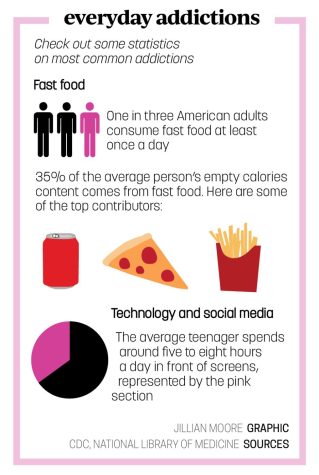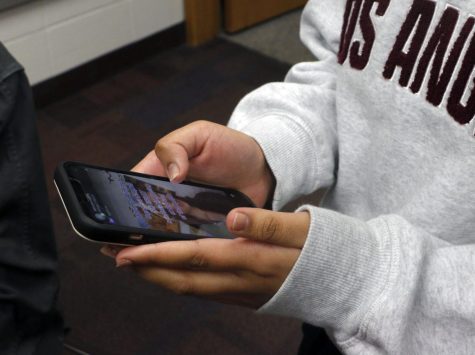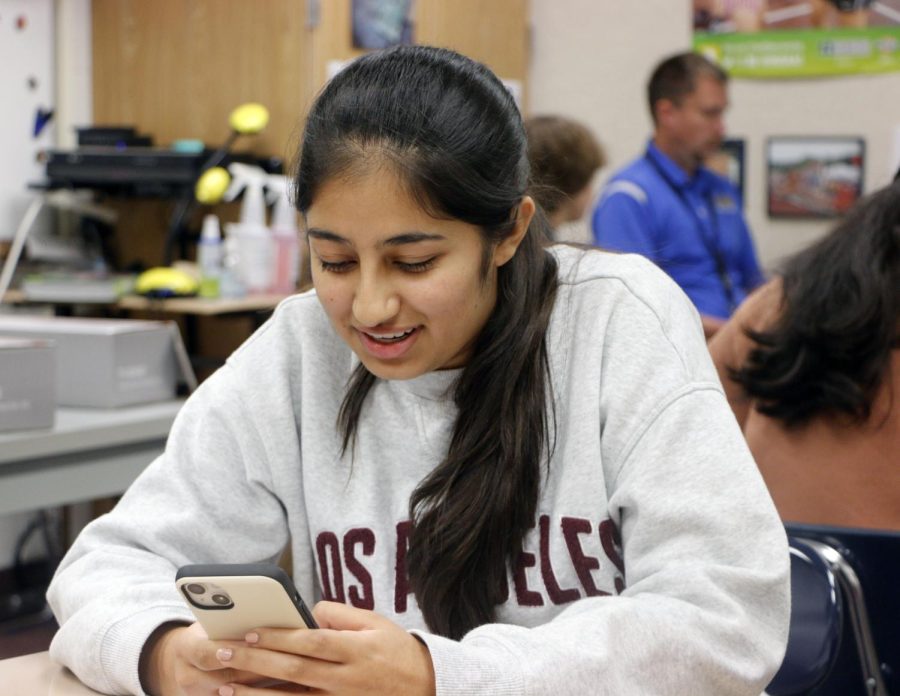Social media has now become a consistent factor in a student’s life. According to a Pew Research Center study from August, 54% of U.S teenagers say it would be hard to give up social media. Sophomore Nina Federici said she falls into that category.
“Social media addictions are really big nowadays. Personally I have been really struggling with staying on task because of it,” Federici said. “I’ll say that I need a break and begin scrolling through social media. Soon, one hour turns into two hours and by the time I start my homework, it is already super late.”
Federici describes her social media use as a cycle that is hard to break out of. Sophomore Juhee Tyagi said she feels the same way.
“It’s honestly really hard especially if you have found yourselves deep down the rabbit hole of social media,” she said.

Tyagi said she’s found ways to recognize when her social media use becomes a problem and has established methods to break the cycle.
“I think that if you really look at yourself and you don’t recognize yourself anymore, that means you need to break away from it immediately,” Tyagi said. “What I did for myself was delete all social media. I began to refocus on school and other activities.”
However, social worker Mary Reese said these kinds of “everyday addictions” doesn’t just affect youth.
“I don’t think social media and cell phone usage is just an issue for teens, but has had both positive and negative impacts on society as a whole,” she said. “Over the past few years, I have observed several different ways that social media has affected students at CHS.”
Reese said the way to break away from social media is to only use it in moderation.
“Think about the times of your day where it might be better to disengage from online use versus when you can allow yourself to indulge. Create healthy boundaries for social media and (for) all things in life. For example, if you are in class keep your phone out of reach and (put it) in your backpack.” Reese said.
For her part, Federici said, “Sometimes I work upstairs, and when I do, I leave my phone downstairs so that I can actually be productive and be able to study and focus.”
Reese said she agrees with Federici on this.
“Social media can distract from anything, including academics,” Reese said. “Part of creating good study habits is creating a workspace for yourself that has limited to no distractions. Electronic devices can impact our ability to focus and sustain attention.”
Federici said when she starts her homework later, it causes her to lose sleep.
“Then, the next day when I wake up, I have a really hard time retaining anything I learn throughout the day because I am still trying to wake up,” she said.
“I feel like the school does make an attempt to provide resources for students, such as counseling. However, each counselor has around 300, students so it would be extremely difficult for the counselors to help everyone who has a habit they are having a hard time to break away from.” Federici said.
“In terms of resources our school counselors and social workers are available to meet with students one on one to talk about anything. If their is an issue that has become serious, our counseling department is ready to work with students and families to help meet the individual needs of the students.” Reese said.

Tyagi said she believes the main reason why many students are unable to break away from their everyday habits and addictions is peer pressure.
“The way social media is set up is not very inclusive in general,” she said. “Sometimes I’ve noticed that people behave a certain way because they see people online do certain things or dress a certain way and they try to imitate them. When they do this, they feel bad about the qualities that make them unique. Social media is not inclusive at all and everyone has to act a certain way in order to be considered ‘cool.’”
“(The) bottom line is that social media does not have to be all bad,” Tyagi added. “Social connections are important. That being said, balance is key. Take some time to think about what social media accounts you use. Think if they are helpful or hurtful for you. If you feel like the impact of your social media is mainly negative, than it is time to make some changes to the amount of social media you take in.”































![British royalty are American celebrities [opinion]](https://hilite.org/wp-content/uploads/2024/03/Screenshot-2024-03-24-1.44.57-PM.png)




















![Review: “The Iron Claw” cannot get enough praise [MUSE]](https://hilite.org/wp-content/uploads/2024/04/unnamed.png)
![Review: “The Bear” sets an unbelievably high bar for future comedy shows [MUSE]](https://hilite.org/wp-content/uploads/2024/03/unnamed.png)
![Review: “Mysterious Lotus Casebook” is an amazing historical Chinese drama [MUSE]](https://hilite.org/wp-content/uploads/2024/03/0.webp)
![Thea Bendaly on her Instagram-run crochet shop [Biz Buzz]](https://hilite.org/wp-content/uploads/2024/03/IMG_0165-1200x838.jpg)
![Review: Sally Rooney’s “Normal People,” is the best book to read when you are in a time of change [MUSE]](https://hilite.org/wp-content/uploads/2024/03/20047217-low_res-normal-people.webp)
![Review in Print: Maripaz Villar brings a delightfully unique style to the world of WEBTOON [MUSE]](https://hilite.org/wp-content/uploads/2023/12/maripazcover-1200x960.jpg)
![Review: “The Sword of Kaigen” is a masterpiece [MUSE]](https://hilite.org/wp-content/uploads/2023/11/Screenshot-2023-11-26-201051.png)
![Review: Gateron Oil Kings, great linear switches, okay price [MUSE]](https://hilite.org/wp-content/uploads/2023/11/Screenshot-2023-11-26-200553.png)
![Review: “A Haunting in Venice” is a significant improvement from other Agatha Christie adaptations [MUSE]](https://hilite.org/wp-content/uploads/2023/11/e7ee2938a6d422669771bce6d8088521.jpg)
![Review: A Thanksgiving story from elementary school, still just as interesting [MUSE]](https://hilite.org/wp-content/uploads/2023/11/Screenshot-2023-11-26-195514-987x1200.png)
![Review: When I Fly Towards You, cute, uplifting youth drama [MUSE]](https://hilite.org/wp-content/uploads/2023/09/When-I-Fly-Towards-You-Chinese-drama.png)
![Postcards from Muse: Hawaii Travel Diary [MUSE]](https://hilite.org/wp-content/uploads/2023/09/My-project-1-1200x1200.jpg)
![Review: Ladybug & Cat Noir: The Movie, departure from original show [MUSE]](https://hilite.org/wp-content/uploads/2023/09/Ladybug__Cat_Noir_-_The_Movie_poster.jpg)
![Review in Print: Hidden Love is the cute, uplifting drama everyone needs [MUSE]](https://hilite.org/wp-content/uploads/2023/09/hiddenlovecover-e1693597208225-1030x1200.png)
![Review in Print: Heartstopper is the heartwarming queer romance we all need [MUSE]](https://hilite.org/wp-content/uploads/2023/08/museheartstoppercover-1200x654.png)























![Review: Ladybug & Cat Noir: The Movie, departure from original show [MUSE]](https://hilite.org/wp-content/uploads/2023/09/Ladybug__Cat_Noir_-_The_Movie_poster-221x300.jpg)

![Review: Next in Fashion season two survives changes, becomes a valuable pop culture artifact [MUSE]](https://hilite.org/wp-content/uploads/2023/03/Screen-Shot-2023-03-09-at-11.05.05-AM-300x214.png)
![Review: Is The Stormlight Archive worth it? [MUSE]](https://hilite.org/wp-content/uploads/2023/10/unnamed-1-184x300.png)


